
|
 |
 |
       
|
 | |
 | |
There are wide variety of steam powered road engines at Hollycombe. These fall into four categories; Showman's Engines, Traction Engines, Agricultural Engines and Road Rollers. All of the engines listed here are operational unless otherwise stated and used regularly for the enjoyment of the public at Hollycombe. | |
 | |
 |
Showman's Engines |
Showman's engines were the power source of the traveling fairgrounds of the early 1900s. They were often the pride of the showmen who turned them out in immaculate condition with much ornate decoration and polished brass. The engines were used to haul the rides between locations, assist with setting up the rides and then to generate electricity to power the lights. |
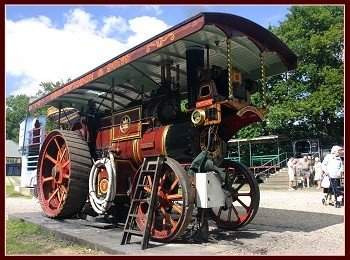
|
EmperorEmperor is the oldest surviving showman's engine in the world and the only single crank compound. She was built by Burrell in 1895 as works No 1876. Emperor is now usually to be found in the centre of the fairground generating electricity for the fairground lights. |
 | |
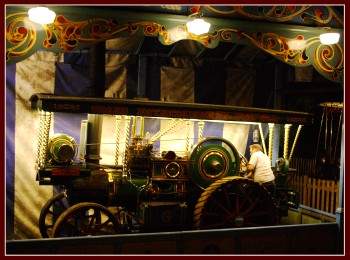
|
Leiston TownLeiston Town is employed in the Bioscope where she generates electricity for the juvenile rides. The engine is a Garrett type 4CD, No 33348 of 1918. She was used in docks at Belfast for hauling ships from basin to basin before being brought to Hollycombe in 1966 in a derelict state. She has since been restored to full operational order, given a dynamo and showman's fittings. |
 |
 |
Traction Engines |
Traction engines were employed on the roads to move goods from place to place. All types of loads were carried from light goods to heavy haulage. Usually goods would be loaded onto one or more 4 wheeled trailers which would be attached behind the engine. For particularly heavy loads, two or more engines would be connected behind each other to provide additional power. |
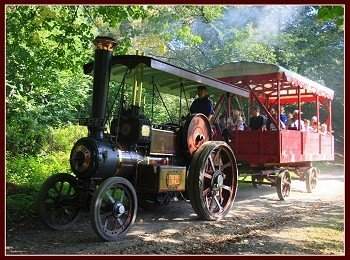
|
Sunset number 2When purchased by Commander Baldock in 1951 it was not realised that this engine would be the start of the famous Hollycombe Steam Collection. Sunset No 2, a Burrell Gold Medal Tractor, used regularly at Hollycombe to haul the woodland ride. |
 | |
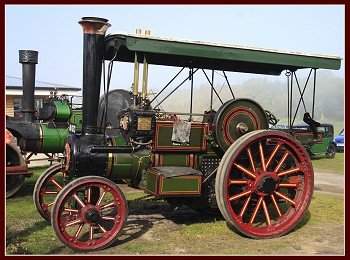
|
TopperTopper is another Burrell Gold Medal tractor, No 3545. She is on loan to Hollycombe from one of our volunteers. |
 |
 |
Agricultural Engines |
Agricultural engines were designed for use on farms, but as they were too expensive for every farm to buy, they often travelled around from farm to farm, performing duties such as threshing, and then moving on to the next farm.
The drivers would live in their living vans which they hauled behind the engine. |
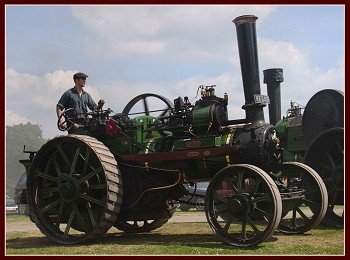
|
Jo-AnnAn Aveling & Porter agricultural engine, Jo-Ann is usually to be seen driving a threshing drum at the farm. Jo-Ann was built in 1912 as works No 8653, and is on loan to Hollycombe from our members. |
 | |
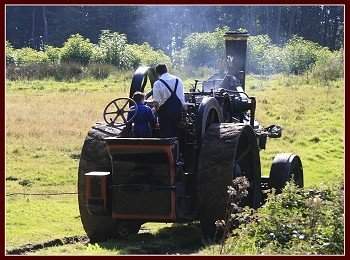
|
PrinceFowler type BB 16nhp ploughing engine, Works No 14383. Prince is now used at Hollycombe paired with the Allen, below, to carry out demonstrations of steam cultivating. |
 | |
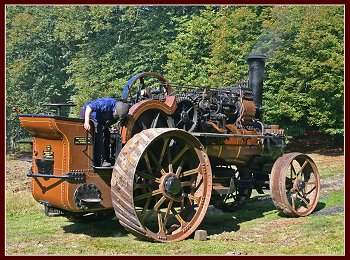
|
Allen 67John Allen & Sons (Oxford) Ltd, ploughing engine No. 67 of 1913. 12nhp compound engine and the only survivor of this make. Allen's were originally agents for Fowler's but later modified Fowler engines and built a few of their own. |
 |
 |
Road Rollers |
Steam powered Road Rollers were used by road making crews to flatten the road bed and the top surface in much the same way as diesel rollers are used now. Crews would live in their living vans which they would tow behind the engine between tasks. |
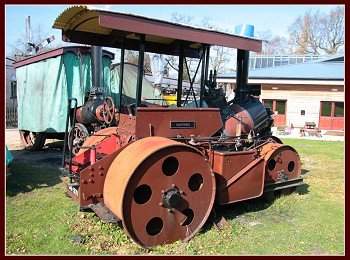
|
ChristopherWallis & Steevens Simplicity roller, Christopher. No. 8023 of 1932. There were only 15 of these engines built. They had a sloping boiler to ensure the firebox remained covered with water at all times, and there very straightforward design was intended to make them easy to operate. The were intended for use on sports grounds, private roads and drives. |
 | |
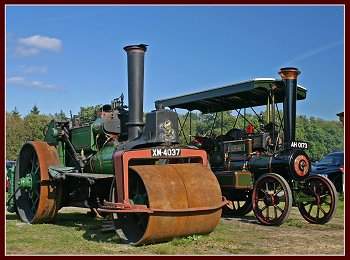
|
DavidA typical steam roller of its age, David was built in 1921. It worked for Islington borough Council until 1955 and arrived at Hollycombe in 1961 where it has done considerable work on drives and roadways. |
 |
 |
Portable Engines |
Hollycombe uses two portable engines, Big John and Eileen, to generate steam for the Gallopers, Razzle Dazzle and Steam Yacht fairground rides. |
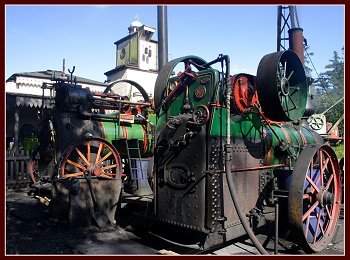
|
Big JohnBig John, a Ruston proctor portable engine, was originally use to belt drive farm machinery but is now used to supply steam to some of Hollycombe's fairground rides. The engine is on loan to Hollycombe. |
 | |
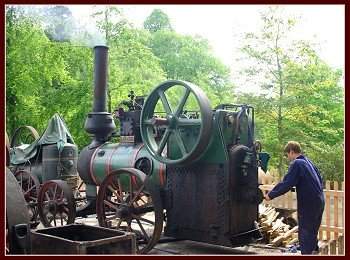
|
EileenEileen, a Clayton and Shuttleworth portable engine was built as a traction engine for export to Russia in about 1917, but was not sent because of the Russian Revolution. |
 |